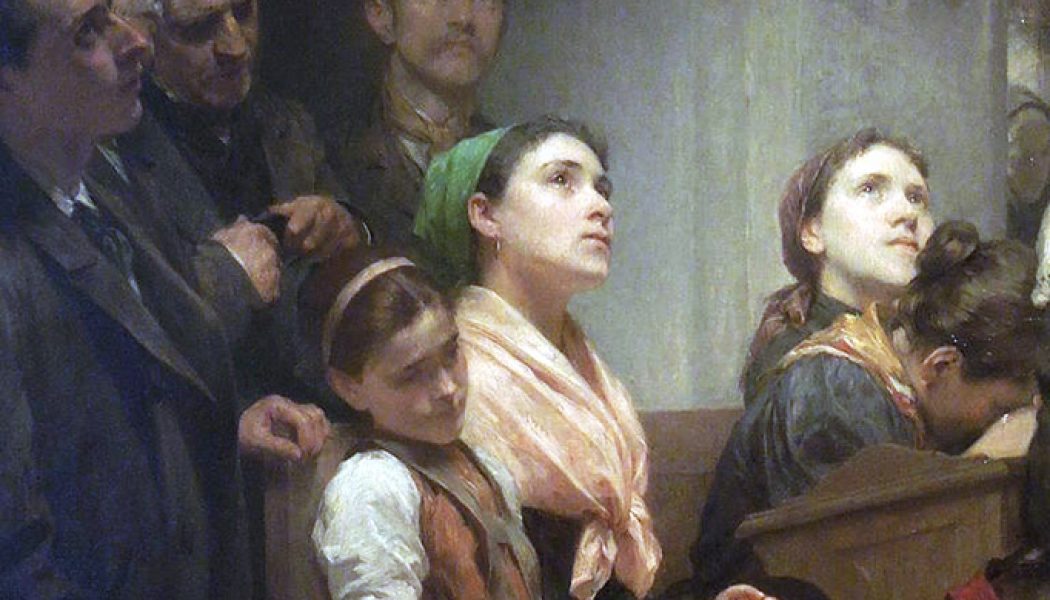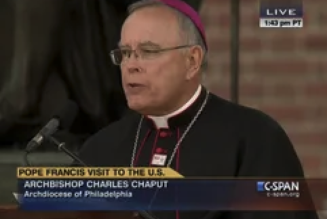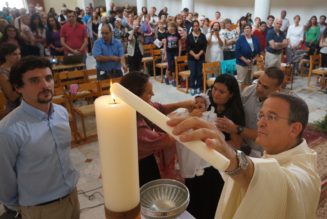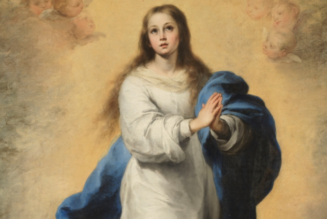
COMMENTARY: Better preaching will increase the hunger and attentiveness to the word of God, and bring more people back to Mass.
On Dec. 16, as Catholic clergy were in the heart of their Advent preparations for Christmas and getting ready to mount the pulpit for one of their most important preaching opportunities of the year, the Pew Research Center released an intriguing, first-of-its-kind study entitled, “The Digital Pulpit: A Nationwide Analysis of Online Sermons.”
Using advanced computer technology, the study examined the websites of 38,630 Christian churches in the U.S., found 6,431 that publish audio or video recordings of the Sunday sermons and homilies in English and analyzed them, among other things, for length and vocabulary. The results were rather striking.
First, the survey revealed that Catholic clergy preach much more briefly than clergy in mainline Protestant churches, evangelical Protestant churches and historic black Protestant churches. The median length of Catholic homilies or sermons was 14 minutes, compared to 25 for mainline Protestant churches (traditional Methodists, Lutherans, Presbyterians, Episcopalians, Baptists, United Church of Christ, Quakers), 39 minutes for Evangelicals (a reawakening movement in some of the mainline churches, as well as Pentecostals, many non-denominational churches and others) and 54 minutes for the historical black Protestant churches (like the African Methodist Episcopal church, various Baptist churches and more).
Second, it showed that relatively few Catholic parishes record homilies and publish them online. Of the 6,098 Catholic churches with websites that were studied, only 422 (7 out of 100) had links to the Sunday homilies — but 32 out of 100 evangelical churches, and 22 out of 100 mainline Protestant churches, do.
Third, Catholic homilies referred far less to sacred Scripture than their counterparts did. In the 2,706 Catholic homilies studied from April and May this year, 68% mentioned the New Testament and 28% mentioned the Old Testament (compared, respectively, to 93%/66% for evangelical Protestant, 85%/65% for historically black Protestant and 82%/43% mainline Protestant). Seventy-three percent of Catholic homilies mentioned one or the other, compared to 97% for evangelical Protestants, 84% for historically black Protestants, and 88% for mainline Protestants.
Lastly, the study examined the vocabulary used by preachers in the various churches. Across the denominations, almost all 49,719 sermons and homilies studied mentioned the words God, Jesus, love, life, good and right. Catholic preaching was distinct in mentioning words like Eucharist (61% of homilies), diocese (30%), Gospel (28%), paschal (28%), John Paul (26%), chalice (25%), parishioner (24%), venerate (24%), and Catholic (19%).
It would be worthwhile to spend some time focusing on what the survey shows about the use of sacred Scripture in Catholic preaching.
Since the survey was conducted from the Fifth Sunday of Lent through the Sixth Sunday of Easter this year, and since the Acts of the Apostles replaces the Old Testament during the Easter Season readings, it’s understandable that Catholic use of the Old Testament might be a little diminished compared to the rest of the liturgical year, but the survey nevertheless reveals that 32% percent of Catholic homilies did not directly cite any of the three New Testament readings given on a particular Sunday and 72% percent didn’t reference the Responsorial Psalm, which is, of course, part of the Old Testament.
Since homilies by definition are meant to focus on the readings and the liturgical prayers of the Mass, one might wonder what the focus of such homilies would be if 27% percent of Catholic homilies — more than one out of four — did not mention the Word of God at all.
It would also be helpful to examine at greater length how few Catholic parishes record and upload their homilies, either audio or video. For 44 years, the popes have been summoning the Church to a new evangelization, a specific outreach to the baptized who no longer practice the faith, and making sermons accessible on websites and via social media is a good means of such outreach.
Since the average American spends 27 hours a week before screens — whether television, computer, tablet or smartphone — it would be a wise investment to leaven those media with what happens in church on the Lord’s day. Uploading recordings of the Sunday homily, something that’s very easy and inexpensive to do, is also a means by which traveling parishioners can remain connected to their parish. Also, attending parishioners can return to it during the week to allow a deeper assimilation of the message, and they can more easily share it with family members, friends and social media networks they know might profit from hearing it.
I would like to focus, however, on what the survey reveals about how short Catholic homilies are compared to Protestant sermons. It’s no surprise that Catholic homilies are shorter. Any Catholic who has had occasion to hear Protestant homilies in person or watch them on television already knows that Protestants generally preach much longer. There’s a liturgical reason why one would expect Catholic homilies to be shorter, for example, than evangelical and historic black Protestant churches, where the Sunday sermon, the reading of sacred Scripture and singing are the main liturgical actions.
Catholic homilies are contained within a liturgy and the length of the Word of God, which involves the readings of the sacred Scripture and the homily, must be proportioned to the Liturgy of the Word-made-flesh, during which Catholics believe that the same Jesus who was born in Bethlehem and adored by Mary, Joseph, the shepherds and the wise men becomes present on the altar and takes up his abode within communicants. If the Liturgy of the Word were too long, it might suggest that it’s no longer an appetizer for the Liturgy of the Eucharist, but the main course.
The typical reason given, however, for why Catholic homilies are shorter — a rationale often heard in seminaries and clergy workshops — is that people today do not have the attention span to follow longer homilies. Catholic priests and deacons, therefore, are explicitly trained, on account of that “fact,” to keep their homilies brief.
While it is true that some adults, and not just children, are affected by diagnosed and undiagnosed attention deficit disorders, something that preachers, teachers, television and movie producers, politicians and public speakers all need to consider, I’ve always found this truism unsatisfying and unintentionally self-deprecatory.
How is it that U.S. Catholics have considerably shorter attention spans than U.S. Protestants, who watch the same programs, listen to the same music, and participate in the same culture? In most places Catholic schools have much higher academic scores than their local public counterparts. If anything, Catholics should have greater attention spans.
Moreover, when Catholics travel to places like the Caribbean, Africa or South America, they discover that Catholic homilies there are much longer than those in North America, and sometimes last even an hour. How is it that average Catholics in rural villages of Uganda or impoverished cities in Haiti have much greater attention spans than their much more educated American counterparts? The premise about Catholic attention spans in the U.S. is, I believe, total nonsense, especially as concerns capabilities.
But there are two ways of looking at attention span. One refers to ability; the other, to interest. While jocks should have the same attention span for NFL games as for the ballet, they’ll snooze at The Nutcracker. Budding actresses have the same natural attentiveness for movies and Shakespeare as for cricket and golf, but they’ll be bored only at the latter. Teen guitar players and rappers should be enraptured by good music, but after 10 minutes of listening to Debussy, you’ll need to take out the defibrillators. Why? Because they lack interest.
The same contrast in attention spans can happen in the faith. If people are interested, their attention span will be greater; if they’re not, then every additional minute is an endurance test.
So why are U.S. Protestants considerably more interested in hearing the word of God explained and applied than their Catholic counterparts? Why do American Protestant ministers have much greater zeal and woe to preach the Gospel than Catholic clergy?
Part of the answer, I think, may be that Protestants in general are noted for a greater love for sacred Scripture and a greater hunger to understand it than Catholics, and Protestant clergy, knowing this, are emboldened to feed that hunger. Part of the reason may also be, as surveys have shown, that Protestant clergy spend much more time on average preparing what they will say on Sunday than Catholic clergy do, and it’s much easier to listen longer to higher quality sermons than poor ones.
I think the calls in various Catholic circles for brief homilies, including by Pope Francis, who urges 8-10 minutes (even though his own homilies are normally considerably longer than that), are based on a prejudice that average Catholic homilies are not very good, probably won’t get better, and therefore are more prone to drive people away than light them on fire, especially the longer they go.
Therefore, it’s no wonder, if the expectation is that Catholic homilies will be boring, uninspiring, unprepared, unintelligible, scattered, monotone, confusing and extraneous to life, that the advice is, “The shorter the better.” Moreover, if faithful have come through experience to have generally low expectations for homiletic excellence, it’s no surprise that they’ll echo, and even incentivize through church-hopping and donations, such advice. And if priests and parishioners think that what’s preached won’t be worth remembering or sharing, perhaps that’s what explains why so few are recorded or uploaded.
Poor and spiritless preaching, as surveys have repeatedly shown, is a major factor in why many have said they stopped coming to Mass or migrated to evangelical or Pentecostal churches. It’s a serious problem.
The solution, however, is not shorter poor and spiritless preaching. It’s much better preaching.
And the better the preaching, the more hunger and attentiveness to the Word of God will grow, the more people will keep coming to Mass and perhaps return, and the more people attending Mass — or listening or watching online — will be prepared to go out into the world to preach the Gospel to every creature.









